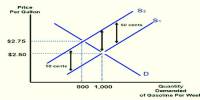According to a micro-simulation study published in Circulation, cutting 20% of sugar from packaged foods and 40% from beverages could prevent 2.48 million cardiovascular disease events (such as strokes, heart attacks, and cardiac arrests), 490,000 cardiovascular deaths, and 750,000 diabetes cases in the United States over the lifetime of the adult population.
A group of researchers from MGH, Tufts University’s Friedman School of Nutrition Science & Policy, Harvard T.H. Chan School of Public Health, and the New York City Department of Health and Mental Hygiene (NYC DOH) developed a model to simulate and quantify the health, economic, and equity impacts of the U.S. National Salt and Sugar Reduction Initiative’s (NSSRI’s) pragmatic sugar-reduction policy.
In 2018, the NSSRI, a collaboration of over 100 local, state, and national health organizations convened by the NYC Department of Health presented proposed sugar-reduction objectives for packaged foods and drinks in 15 categories. The NSSRI finalized the strategy in February with the purpose of getting the sugary food sector to agree to gradually reformulate their goods.
However, enacting a national framework will need government assistance in monitoring corporations as they work toward their goals and publicly report on their achievement. The researchers anticipate that their approach will help to establish an agreement in the United States about the necessity for a national sugar reformulation strategy.
“We hope that this study will help push the reformulation initiative forward in the next few years,” says Siyi Shangguan, MD, MPH, lead author, and attending physician at MGH. “Reducing the sugar content of commercially prepared foods and beverages will have a larger impact on the health of Americans than other initiatives to cut sugar, such as imposing a sugar tax, labeling added sugar content, or banning sugary drinks in schools.”
According to the estimate, the United States could save $4.28 billion in overall net healthcare expenses and $118.04 billion over the lifespan of the existing adult population (ages 35 to 79) ten years after the NSSRI policy takes effect. When the social costs of lost output from Americans suffering ailments as a result of excessive sugar intake are included in, the NSSRI policy saves $160.88 billion over the lifetime of the adult population.
Because the calculations were conservative, these benefits are likely to be underestimated. The study also showed that even 50% compliance with the regulation by the sector might result in considerable health and economic benefits.
Sugar is one of the most obvious additives in the food supply to reduce to reasonable amounts. Our findings suggest it’s time to implement a national program with voluntary sugar reduction targets, which can generate major improvements in health, health disparities, and healthcare spending in less than a decade.
Dariush Mozaffarian
The NSSRI strategy became cost-effective after six years and cost-saving after nine years, according to the study. The legislation could also minimize inequities, with the biggest health benefits expected for Black and Hispanic individuals, as well as Americans with lower income and less education, who consume the most sugar as a result of inequitable policies in the past.
Other hazardous elements, like as trans fats and salt, have been reduced as a result of product reformulation initiatives. The United States, on the other hand, lags behind other nations in enacting significant sugar-reduction measures, with countries like the United Kingdom, Norway, and Singapore leading the charge in sugar-reformulation initiatives.
If the NSSRI’s suggested sugar-reduction objectives are met, the United States might become a leader in safeguarding its citizens from the hazards of excessive sugar intake. “The NSSRI policy is by far the most carefully designed and comprehensive, yet achievable, sugar-reformulation initiative in the world,” says Shangguan.
Sugary foods and drinks are associated to obesity and illnesses including type 2 diabetes and cardiovascular disease, which is the leading cause of death in the United States. More than two out of every five persons in the United States is obese, one out of every two has diabetes or prediabetes, and almost one out of every two has cardiovascular disease, with those from lower socioeconomic categories bearing the brunt of the load.
“Sugar is one of the most obvious additives in the food supply to reduce to reasonable amounts,” says Dariush Mozaffarian, MD, DrPH, co-senior author and dean of the Friedman School of Nutrition Science and Policy at Tufts University.
“Our findings suggest it’s time to implement a national program with voluntary sugar reduction targets, which can generate major improvements in health, health disparities, and healthcare spending in less than a decade.”
The National Institutes of Health contributed significant support for this research. Shangguan is an attending physician at Massachusetts General Hospital and a professor of medicine at Harvard Medical School. Mozaffarian is the dean of Tufts University’s Friedman School of Nutrition Science and Policy.
Thomas Gaziano, MD, MSc, is an assistant professor of medicine at Harvard Medical School and an associate professor at Brigham and Women’s Hospital. Renata Micha, Ph.D., is an associate professor at the University of Thessaly in Greece and a research associate professor at Tufts University’s Friedman School of Nutrition Science and Policy.
















